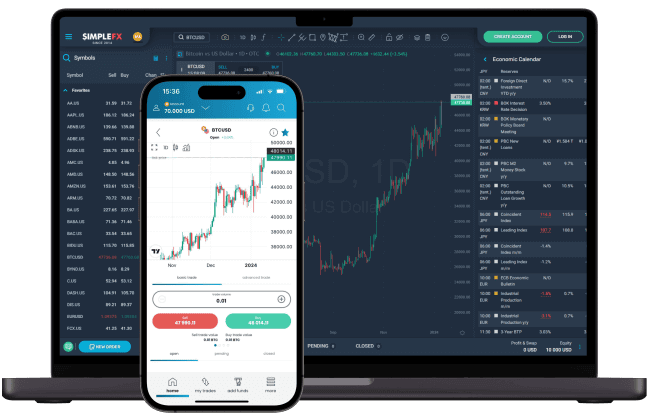Trading glossary

Altcoin
Arbitrage
Ask Price
Asset
Asset is a resource that can be possessed and exchanged between parties. Currencies, equities, commodities, or cryptocurrencies are some examples of assets.
Automated trading
Base Rate
Bear and bull market
Bid Price
Bitcoin
Bitcoin is a cryptocurrency created in 2009, based mainly on a self-published paper by Satoshi Nakamoto. Bitcoin enables immediate payments (and micropayments) at a very low cost, while avoiding the need for central authorities and issuers.
Blockchain
Blockchain is a decentralized digital ledger that records transactions across multiple computers. This technology underpins cryptocurrencies like Bitcoin, ensuring security and transparency by preventing alteration of transaction data once recorded.
Brent Crude
UKOIL, often referred to as Brent Crude, is a major benchmark for global oil prices. It plays a crucial role in the commodities market, influencing the prices of related assets like USOIL. Monitoring UKOIL prices helps traders and investors understand supply and demand dynamics in the energy sector.
Commodities
Commodities are basic goods used in commerce that are interchangeable with other foods of the same type. Key examples include oil, a primary energy source with significant impact on global markets; cocoa, essential for the production of chocolate and other food items; and natural gas, a major energy source for heating and electricity.
Consumer Price Index (CPI)
Coordinated Universal Time (UTC)
Cryptocurrencies
Cryptocurrencies are digital or virtual currencies that use cryptography for security, making them difficult to counterfeit. The most well-known cryptocurrency is Bitcoin, recognized for its pioneering role. Other major cryptocurrencies include Ethereum, known for its smart contract capabilities, and Solana, famed for its high-speed transactions and scalability.
Currency Peg
Usually currencies used in different countries can be freely exchanged between buyer and sellers. It is less common that they are pegged, tied to the price of another currency, usually at the 1:1 ratio. Cryptos can be pegged as well. The most popular are stablecoins tied to the U.S. dollar, such as Tether, USD Coin, or Binance Coin.
Decentralized applications (dApps)
dApps are applications that run on a decentralized network, typically powered by blockchain technology. Ethereum is a popular platform for developing dApps, which are pivotal to sectors like DeFi (decentralized Finance). Users often access dApss using a crypto wallet.
Decentralized finance (DeFi)
Decentralized Finance, or DeFi, refers to a financial system built on blockchain technology that operates without central financial intermediaries. It utilizes smart contracts and cryptocurrencies to provide more open and transparent financial operations compared to traditional banking.
Derivative
A derivative is a financial security whose value is dependent upon or derived from an underlying asset or group of assets. Common underlying instruments include equities, bonds, commodities, currencies, interest rates, and market indices.
Dividend
A dividend is a portion of a company’s earnings distributed to shareholders, typically in cash or additional shares. Companies like Tesla and MicroStrategy may offer dividends as a way to return value to shareholders, affecting stock price and investor interest.
Economic Indicator
An economic indicator is a statistic about an economic activity, helping analysts assess overall economic health. Key indicators include the NFP (Non-Farm Payrolls), which signals employment trends; the FOMC (Federal Open Market Committee) announcements, influencing monetary policy; and the CPI (Consumer Price Index), measuring inflation.
Equities
Ethereum
Ethereum is a decentralized platform known for its ability to execute smart contracts and develop decentralized applications (dApps). Unlike Bitcoin, which is primarily a digital currency, Ethereum allows for complex agreements coded directly into the blockchain.
Euro
The Euro (EUR) is the official currency of the Eurozone, which includes 20 of the 27 European Union countries. As one of the world’s major currencies, it plays a crucial role in global markets, particularly in forex trading. The EURUSD currency pair measures the value of the Euro against the U.S. Dollar, is among the most traded pairs.
First In, First Out (FIFO)
Forex Broker
Fundamental analysis
Future Contract
Game Finance (GameFi)
GameFi refers to the blend of gaming based on blockchain with financial elements. These games often incorporate features from DeFi and operate as dApps, allowing players to earn real-world value through gameplay.
Greenwich Mean Time (GMT)
GMT (Greenwich Mean Time) is the mean solar time at the Royal Observatory in Greenwich, London. It serves as a global time standard, crucial for international trading activities. In the forex market, pairs like GBPUSD and indices such as the FTSE100 operate on schedules aligned with GMT.
Gross Domestic Product (GDP)
Halving
Halving is a significant event in the Bitcoin network where the reward for mining new blocks is cut in half. This process occurs approximately every four years and is designed to control inflation by reducing the rate at which new bitcoins are generated.
Hash
A hash is a fixed-length code generated from data of any size, using a mathematical function. It is crucial in blockchain technology for ensuring data integrity and security. Hash functions are also foundational in various DeFi.
Hedging
High Frequency Trading (HFT)
Indices
Indices are statistical measures that track the performance of a group of equities, representing a specific segment of the stock market. They are used by investors and economists to gauge market trends and compare the reuters of various assets. Key indices include the S&P500, which monitors the performance of 500 large companies listed on stock exchanges in the United States; the NASDAQ known for its high focus on technology stocks; the NIKKEI225, a major index tracking 225 top-rated companies listed in Japan; and the European STOXX 50.
Initial Public Offering (IPO)
Interest
Intrinsic Value
Kiwi
Know Your Customer (KYC)
Leverage
Limit order
Liquidation price
Liquidity
Long Position
Traders who want to buy an asset - for example a currency pair - open a long position. If an investor buys EURUSD, it means that a long position is opened.
Margin
Margin Call
Metals
Metals in the financial markets refer to precious and industrial metals that are traded on commodities exchanges around the world. Key precious metals include gold and silver, often traded as XAUUSD and XAGUSD, which serve as important investment assets and hedges against inflation. Industrial metals like palladium and platinum are crucial for various manufacturing processes.
Mining
In the context of cryptocurrencies, mining refers to the process of validating transactions and adding them to the blockchain ledger. This is achieved through a method known as proof of work, which requires miners to solve complex mathematical problems. Bitcoin is the most well-known cryptocurrency that uses mining to maintain network security and integrity.
Net Position
Node
In the context of crypto networks, a node is a computer that connects to a crypto network and suppros its functionality by verifying and relaying transactions. Nodes maintain a copy of the entire blockchain, ensuring the network’s decentralization and security.
Non-Farm Payroll (NFP)
Non-Farm Payrolls (NFP) is a key economic report that indicates the number of jobs added in the U.S. economy, excluding farm employees, government employees, private household employees, and employees of nonprofit organizations. It is closely monitored by the FOMC (Federal Open Market Committee) and investors as it influences monetary policy decisions and can impact the CPI (Consumer Price Index).
Non-Fungible Token (NFT)
An NFT, or Non-Fungible Token, is a unique digital asset that represents ownership of a specific item or piece of content, such as art, music, or videos, using blockchain technology. NFTs are primarily built on the Ethereum blockchain, which supports these tokens through its smart contract capabilities. They are not interchangeable, making each token distinct and valuable in its own right.
Offer Price
Open Position
Open-Source
Peer-to-Peer (P2P)
Peer-to-peer (P2P) refers to a decentralized network architecture where participants, or peers, share resources without the need for a centralized administrative system. This concept is fundamental in the Bitcoin network, where transactions are directly exchanged between users without intermediaries, facilitated by blockchain technology.
Profit
Proof of Stake (PoS)
Proof of stake (PoS) is a consensus mechanism used by certain crypto networks to validate transactions and secure the blockchain. Unlike proof of work, which requires extensive power, PoS involves validators who are chosen to create nie blocks based on the number of coins they hold. Ethereum is a notable cryptocurrency that has transitioned to PoS.
Proof of Work (PoW)
Proof of Work (PoW) is a consensus algorithm foundational to many crypto networks, including Bitcoin. It requires participants, known as miners, to solve complex mathematical problems in order to validate transactions and secure the blockchain. The first miner to solve the problem earns the right to add the new block to the blockchain and receives a reward in cryptocurrency.
Quantitative Easing (QE)
Quote Currency
In forex trading, the quote currency is the second currency in a currency pair and represents how much of this currency is needed to exchange for one unit of the base currency. For instance, in the EURUSD pair, the USD is the quote currency. It means traders need to know how many U.S. dollars it takes to buy one Euro.
Rate Of Return (RoR)
Risk Management
Risk management involves identifying, assessing, and prioritizing risks followed by coordinated efforts to minimize, monitor, and control the probability or impact of unfortunate events. In trading crypto, indices, and commodities, effective risk management is crucial for protecting investments.
Rollover
Short Position
Size
Slippage
Spot Market
Spread
Stop Loss
Stop Order
Take Profit
Technical Analysis
Trailing Stop
Value
In trading, value refers to the worth of an asset, determined by factors like market demand, intrinsic attributes, and overall economic conditions. In the forex market, the value of currency pairs such as EURUSD is impacted by various economic indicators, interest rates, and geopolitical events.
Volatility
Volatility measures the degree of variation in the price of an asset over time. High volatility indicates significant price swings, common in markets like crypto, particularly with assets like emerging altcoins.
Wallet
Wallets are an essential tool of every crypto trader. It enables them to connect with various blockchain and to send and receive crypto assets. Crypto wallets stand as the crucial tools especially due to the development of decentralized finance (DeFi).
Web3
Web3 represents the next generation of the internet, focusing on decentralization and user empowerment through crypto and blockchain technologies. It focuses on creating a more open and user-controlled digital ecosystem, integrating innovations from Bitcoin and other blockchain-based platforms.
Whitepaper
WTI Crude
USOIL, often referred to as West Texas Intermediate (WTI), is a major benchmark for crude oil prices in the United States. It plays a significant role in the commodities market, influencing global oil prices alongside UKOIL.


